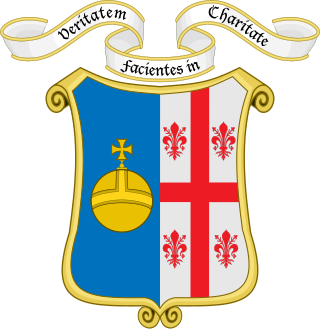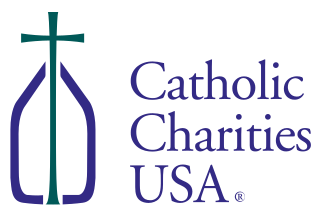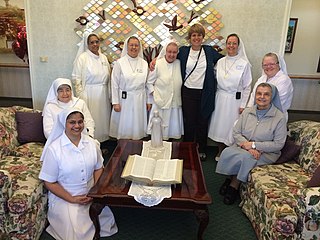
The Catholic Church in Australia is part of the worldwide Catholic Church under the spiritual and administrative leadership of the Holy See. From origins as a suppressed, mainly Irish minority in early colonial times, the church has grown to be the largest Christian denomination in Australia, with a culturally diverse membership of around 5,075,907 people, representing about 19.9% of the overall population of Australia according to the 2021 ABS Census data.
The Franciscan Sisters of Christian Charity are a Congregation of Roman Catholic apostolic religious women. The congregation was founded in 1869 in Manitowoc, Wisconsin in the Roman Catholic Archdiocese of Milwaukee, later part of the Roman Catholic Diocese of Green Bay. The sisters have active apostolates in education, health care, spiritual direction, and other community ministries. As of 2021, there are 188 sisters in the community. The FSCC is a member of the Council of Major Superiors of Women Religious, an organization which represents women religious in the United States.
Catholic schools are pre-primary, primary and secondary educational institutions administered in association with the Catholic Church. As of 2011, the Catholic Church operates the world's largest religious, non-governmental school system. In 2016, the church supported 43,800 secondary schools and 95,200 primary schools. The schools include religious education alongside secular subjects in their curriculum.

Christians in Bangladesh account for 0.30% of the nation's population as of 2022 census. Together with Judaism and Buddhism, they account for 1% of the population. Islam accounts for 91.04% of the country's religion, followed by Hinduism at 7.95% as per 2022 census.

The Institute of Christ the King Sovereign Priest is a Roman Catholic society of apostolic life of pontifical right in communion with the Holy See of the Catholic Church. The institute has the stated goal of honoring God and the sanctification of priests in the service of the Catholic Church and souls. An integral part of the institute's charism is the use of the traditional Latin liturgy of 1962 for Mass and the other sacraments. It has undertaken the restoration of a number of historic church buildings.

Catholic Relief Services (CRS) is the international humanitarian agency of the Catholic community in the United States. Founded in 1943 by the Bishops of the United States, the agency provides assistance

Louise de Marillac , also Louise Le Gras, was the co-founder, with Vincent de Paul, of the Daughters of Charity. She is venerated as a saint by the Catholic Church and the Episcopal Church in the United States of America.

A society of apostolic life is a group of men or women within the Catholic Church who have come together for a specific purpose and live fraternally. It is regarded as a form of consecrated life.

The Archdiocese of Miami is a particular church of the Catholic Church in the United States of America. Its ecclesiastical territory consists of Broward, Miami-Dade and Monroe counties in the U.S. state of Florida. The archdiocese is the metropolitan see for the Ecclesiastical Province of Miami, which covers Florida. The archbishop is Thomas Wenski. As archbishop, he also serves as pastor of the Cathedral of Saint Mary, the mother church of the archdiocese. Also serving are 258 priests, 133 permanent deacons, 41 religious brothers and 204 religious sisters who are members of various religious institutes. These priests, deacons and persons religious serve a Catholic population in South Florida of 475,774 in 109 parishes and missions.

The Catholic Church in Afghanistan is part of the worldwide Catholic Church. There are very few Catholics/Christians in this overwhelmingly Muslim country—just over 200 attend Mass in its only chapel—and freedom of religion has been difficult to obtain in recent times, especially under the new de facto Taliban regime.

The Catholic Church in Tajikistan is part of the worldwide Catholic Church in Tajikistan, under the spiritual leadership of the Pope in Rome. In 2009, the size of the community was estimated at 300 people.

Catholic Charities is a network of charities with headquarters in Alexandria, Virginia. In 2005, Forbes magazine ranked it as the fifth largest charity in the United States in terms of total revenue. The organization serves millions of people a year, regardless of their religious, social, or economic backgrounds. In 2019, 12 million persons were served at more than 2600 locations. Next to the federal government, Catholic Charities is the largest US social-safety-net provider.
The Catholic Near East Welfare Association is a papal agency established in 1926 and dedicated to giving pastoral and humanitarian support to Northeast Africa, the Middle East, Eastern Europe, and India. CNEWA operates specifically in areas of concentrated mass poverty, war, and displacement, providing human dignity and addressing basic needs for vulnerable populations. As a Catholic organization CNEWA utilizes the network of Eastern Catholic Churches and devoted religious sisters to provide the most effective and holistic humanitarian support regardless of creed or religious affiliation. As sisters with CNEWA have stated, "We don't help people because they're Christian. We help [them] because we are."

The Sisters of Providence of Holyoke, Massachusetts, are a congregation of Roman Catholic religious sisters founded in 1892.

The Catholic Church is the largest non-government provider of health care services in the world. It has around 18,000 clinics, 16,000 homes for the elderly and those with special needs, and 5,500 hospitals, with 65 percent of them located in developing countries. In 2010, the Church's Pontifical Council for the Pastoral Care of Health Care Workers said that the Church manages 26% of the world's health care facilities. The Church's involvement in health care has ancient origins.

The Franciscan Hospitaller Sisters of the Immaculate Conception are members of a Roman Catholic religious institute of consecrated women, which was founded in Portugal in 1871. They follow the Rule of the Third Order Regular of St. Francis. and, as the term “hospitaller” indicates, focus their ministries on a spirit of medical care. Their charism emphasizes hospitality and service under the model of the Good Samaritan. In this congregation, the postnominal initials used after each sister's name is "F.H.I.C."

Caritas Internationalis is a confederation of 162 Catholic relief, development and social service organizations operating in over 200 countries and territories worldwide.
Christian humanitarian aid is work performed by Christian non-governmental organizations (NGOs) to alleviate the suffering of people around the world. Charity is a concept of great importance in Christianity. Humanitarian aid occurs in areas where some churches donate financial resources and get involved in order to show compassion.














